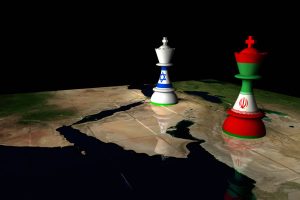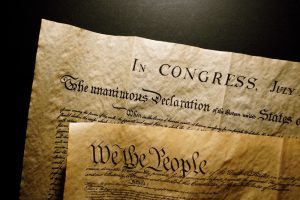The Palestinian Hamas terror movement recently banned Palestinians living under its control in the Gaza Strip from celebrating International Women’s Day. Hamas dismissed a decision by the Palestinian Authority (PA) government in the West Bank to give all civil servants a day off on this occasion, arguing that International Women’s Day was a “Western and foreign” event that is incompatible with Islamic traditions and teachings.
The Islamic movement also issued a warning to all public and private institutions in the Gaza Strip, including schools and universities, to refrain from marking the occasion.
Hamas’s decision drew sharp criticism from many Palestinians, especially women’s groups and human rights organizations, as well as the Palestinian Authority. The critics maintained that the ban was a sign of Hamas’s disrespect for women and their contribution to Palestinian society.
The General Union of Palestinian Workers issued a statement in which it condemned Hamas’s refusal to acknowledge and honor the role of Palestinian women. The statement said that Palestinian women have made huge sacrifices and contributed remarkably to the Palestinian labor force and the development of society.
The Hamas ban also angered many Palestinian men, who expressed outrage over the “humiliation” of Palestinian women. Fathi Tbail, a leading Palestinian journalist, commented: “I will celebrate International Women’s Day, whether you (Hamas) like it or not. All you represent is retardation!”
But not all Palestinians were protesting the latest Hamas insult against Palestinian women. Take, for instance, Linda Sarsour.
Sarsour is a US-based supporter of sharia law and the anti-Israel BDS movement who chose, instead of condemning Hamas for cancelling International Women’s Day, to spew her hatred against Israel and Zionism.
The prominent Palestinian-American feminist declared in an interview that support for feminism and Zionism are incompatible. Sarsour told The Nation:
“It just doesn’t make any sense for somebody to say, ‘Is there room for people who support the state of Israel and do not criticize it in the movement?’ There can’t be in feminism. You either stand up for the rights of all women, including Palestinians, or none. There’s just no way around it.”
Sarsour seems somewhat oblivious to the suffering of her fellow Palestinian women under the Palestinian Authority and Hamas. She demonstrates concern for women’s rights under one condition: when she can blame Israel.
One wonders what her position is on Hamas’s cancellation of International Women’s Day. Or about severe restrictions imposed on Palestinian women in the Gaza Strip, including denial the right to sit in a restaurant or go to the beach unaccompanied by a male relative. How about her response to Hamas’s ban on women smoking water pipes in cafes, under the pretext that it violates traditions and leads to divorce?
Just as an aside, is the feminist Sarsour aware that women living under Hamas have been banned from riding motorcycles and scooters? Is she aware that Hamas has also banned women from running in a marathon organized by the United Nations?
These are embarrassing truths that the pro-Hamas feminist does not want to hear. Why? Because Linda Sarsour’s hatred for Israel and Zionism supersedes her solidarity with her fellow Palestinian women. The rights of women who are being oppressed by Hamas are the last thing on her mind. For Sarsour and her ilk in the Palestinian-American feminist movement, the delegitimization and demonization of Israel and Jews is what matters. Sitting in the comfort of the U.S. and other Western countries, Sarsour and her colleagues are too busy inciting against Israel to remember the plight of women in most Arab countries, including those living under the Palestinian Authority and Hamas.
Perhaps it would be helpful to the cause of Palestinian women if Sarsour chose to raise the case of Palestinian lawmaker and anti-corruption campaigner Najat Abu Baker. Because of her heroic campaign and outspoken criticism against corruption in the PA leadership, Abu Baker has been stripped of her parliamentary immunity and expelled from the ruling Fatah faction by PA (and Fatah) President Mahmoud Abbas. Recently, the PA also banned Abu Baker from leaving the West Bank. She was supposed to travel to Lebanon to attend a ceremony in which she was expected to be honored as the most respected lawmaker in the Arab world.
Yet, Sarsour has not said a word to defend women like Abu Baker.

Prominent Palestinian-American feminist Linda Sarsour (left) demonstrates concern for women’s rights only when she can blame Israel. Sarsour has not said a word to defend women like anti-corruption campaigner Najat Abu Baker (right), who was stripped of her parliamentary immunity and expelled from the ruling Fatah faction by Palestinian Authority President Mahmoud Abbas. |
Nor is she interested in the enormous progress that Arab women have made in Israel. While Abu Baker is being persecuted by the PA, Arab women serving in the Knesset are free to speak and work without fear.
One wonders, too, what Sarsour and her fellow feminists think about the treatment of gays living under the Hamas and PA regimes. This, at a time when an Arab citizen of Israel, Tallen Abu Hanna, won the Miss Trans Israel contest last year. Worse, in Iran, members of the gay community are being hanged in public.
In another sign of the empowerment of Arab women in Israel and their success, last year the Israeli government appointed Mariam Kabaha as National Commissioner for Equal Employment Opportunities at the Ministry of Economy and Industry. Kabaha, an Israeli Arab woman, was chosen for the position from among 60 candidates.
While Sarsour advocates sharia law, the trend of Muslim Arab Israeli women circumventing Islamic sharia courts in favor of Israel’s civil courts has been gaining momentum, according to Roy Brumer, a Jewish lawyer representing some of these women. Sharia courts in Israel have jurisdiction for Muslims over personal status issues such as divorce, marriage and conversion. However, over the past several years, Brumer has noticed an uptick in the number of women seeking his services.
Sarsour might take heed: Arab women in Israel enjoy more rights and freedom than most women in Iran, Sudan, Kuwait and Saudi Arabia. In Israel, women are free to run in elections and go to the beach or a shopping mall without being accompanied by a male relative. In Israel, Arab women are free to drive cars and serve as judges in Israeli civilian courts. In Israel, women are not forced to wear the hijab. Has Sarsour heard of Ghada Bsul, who serves as a judge with the Haifa Court for Local Affairs? Or is that not of interest to her?
Sarsour’s claim, that Zionism and feminism are incompatible, is nothing but a grimy lie. In the Zionist state of Israel, Arab women have risen to senior positions and enjoy a great deal of freedom in all walks of life. “Feminists” like Sarsour, however, wish to take women’s cause back centuries. With feminists like that, who needs enemies?
Bassam Tawil is a scholar based in the Middle East.







































